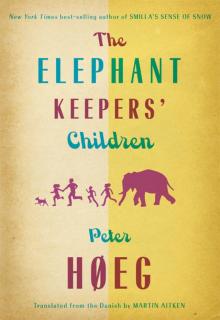- Home
- Peter Høeg
The Elephant Keepers' Children
The Elephant Keepers' Children Read online
ALSO BY PETER HØEG
Smilla’s Sense of Snow
Borderliners
The Woman and the Ape
History of Danish Dreams
Tales of the Night
The Quiet Girl
Copyright © Peter Høeg and Rosinante&Co, Copenhagen 2010.
Published by agreement with the Gyldendal Group Agency.
Originally published as Elefantpassernes børn
by Rosinante&Co, Copenhagen, in 2010.
Translation copyright © Martin Aitken 2012
English translation first published in the United Kingdom by Harvill Secker, London, in 2012.
Production Editor: Yvonne E. Cárdenas
All rights reserved. No part of this publication may be reproduced or transmitted in any form or by any means, electronic or mechanical, including photocopying, recording, or by any information storage and retrieval system, without written permission from Other Press LLC, except in the case of brief quotations in reviews for inclusion in a magazine, newspaper, or broadcast. For information write to Other Press LLC, 2 Park Avenue, 24th Floor, New York, NY 10016. Or visit our Web site: www.otherpress.com
THE LIBRARY OF CONGRESS HAS CATALOGED THE PRINTED EDITION AS FOLLOWS:
Høeg, Peter, 1957-
[Elefantpassernes børn. English]
The elephant keepers’ children / Peter Høeg; translated from the Danish by Martin Aitken.
p. cm.
eISBN: 978-1-59051-491-7
1. Families—Religious life—
Fiction. 2. Religious tolerance—Fiction. 3. Missing persons—
Fiction. 4. Domestic fiction. I. Aitken, Martin. II. Title.
PT8176.18.O335E4413 2012
839.8’1374—dc23
2012015734
Publisher’s Note:
This is a work of fiction. Names, characters, places, and incidents either are the product of the author’s imagination or are used fictitiously, and any resemblance to actual persons, living or dead, events, or locales is entirely coincidental.
v3.1
for
Awiti, Adoyo, Ajuang, Apiyo, Akinyi, and Karsten
for
Stine and Daniel
In case you wish to befriend
an elephant keeper,
make certain to have room
for the elephant.
—OLD INDIAN SAYING
Contents
Cover
Other Books by This Author
Title Page
Copyright
Dedication
Epigraph
Part One: Finø
Chapter 1
Chapter 2
Chapter 3
Chapter 4
Chapter 5
Chapter 6
Chapter 7
Chapter 8
Chapter 9
Chapter 10
Chapter 11
Chapter 12
Chapter 13
Chapter 14
Chapter 15
Chapter 16
Chapter 17
Chapter 18
Chapter 19
Chapter 20
Chapter 21
Chapter 22
Chapter 23
Chapter 24
Chapter 25
Chapter 26
Chapter 27
Chapter 28
Chapter 29
Part Two: The Sea of Opportunity
Chapter 30
Chapter 31
Chapter 32
Chapter 33
Chapter 34
Chapter 35
Chapter 36
Chapter 37
Chapter 38
Chapter 39
Chapter 40
Part Three: The City of Gods
Chapter 41
Chapter 42
Chapter 43
Chapter 44
Chapter 45
Chapter 46
Chapter 47
Chapter 48
Chapter 49
Chapter 50
Chapter 51
Chapter 52
Chapter 53
Chapter 54
Chapter 55
Chapter 56
Chapter 57
Chapter 58
Chapter 59
Chapter 60
Chapter 61
Chapter 62
Chapter 63
Chapter 64
Chapter 65
Chapter 66
Chapter 67
Chapter 68
Chapter 69
Part Four: The Finø Waltz
Chapter 70
Acknowledgments
1
I have found a door out of the prison. It opens out onto freedom. I am writing this to show you that door.
You might ask how much freedom he thinks he’s entitled to, this boy who was born on Finø, the island they call Denmark’s Gran Canaria, and in the rectory to boot, with its twelve rooms and a garden as big as a park, and not only that but born into the midst of a father and mother, an older sister and older brother, and grandparents and a great-grandmother, and a dog, all of which sounds like an advert for something expensive but a worthwhile investment for all the family.
And while there might not be that much to see when I look at myself in the mirror, being the second smallest in the seventh class of Finø Town School, and on the skinny side too, there are many older, heavier players on the football fields of Finø who can only watch as I sail by like a surfer on the wind and feel their hair stand on end when I let fly with my lethal right foot.
So what’s he complaining about? you might ask. How does he think other fourteen-year-old boys feel? And there would be two answers to that.
The first is that you’re right, I shouldn’t complain. But when Father and Mother disappeared and things became complicated and hard to explain, I discovered there was something I’d forgotten. I’d forgotten, while everything had still been bright, to seek to discover what will always endure, what can really be relied on when it starts to get dark.
The second answer is the hardest. Take a look around. How many people seem happy to you? Even if you have a father with a Maserati and a mother with a mink coat, as we had in the rectory once, how many people actually have anything to cheer about? Isn’t it okay, then, to ask what can set a person free?
Now you might say that as far as the eye can see the world is full of people who’ll tell you which direction to choose and what to do, and that I’m just one of them, and in a way you’d be right, though in another this is different.
If you ever heard my father give a sermon at Finø Town Church before he disappeared, then you’ll have heard him say that Jesus is the way. My father can say that so beautifully and effortlessly you’d think we were talking about the way down to the harbor and that we’d all be there in a minute.
If you’d heard the service from a stool next to the organ, as played by my mother, and if you’d remained seated afterward, she would have told you that music was the future. She plays and speaks in such a way that you would have already booked your first piano lesson and be on your way to spend your life savings on a baby grand.
If, after the service, you’d come back for coffee on one of those occasions when my favorite uncle, Jonas, who goes bear hunting in Outer Mongolia and has a stuffed bear standing in his hall and who has now become a union man, was staying with us, then you might have heard him say at some length that what really gets the ball rolling is having confidence in yourself and devoting your life to organizing the working classes, and he says this not just to wind up my father, but because it’s something he truly believes.
If you ask anyone at my school, they’ll tell you that life doesn’t
begin till after ninth class, since that’s when most of the children of Finø move away to board at the high school or begin vocational programs in Grenå.
And finally, in a different direction altogether, if you asked the residents of Big Hill, which is a rehab center just west of Finø Town, all of whom were substance abusers by the time they were sixteen, if you ask them straight out, one on one, they’ll tell you that even though they’re totally clean and deeply grateful for their treatment and are looking forward to starting a new life, nothing even comes close to the long, mellow high you get from smoking opium or shooting heroin.
And I’ll tell you this: I’m certain all these people are right, including the residents of Big Hill.
That’s something I learned from my older sister, Tilte. One of Tilte’s talents is that she can believe all people are right and yet at the same time be wholly convinced that she alone knows what she’s talking about.
All these people I’ve mentioned, what each of them reveals is the door to their own favorite room, and inside that room is Jesus, or the songs of Schubert, or the national achievement test after ninth class, or a stuffed bear, or a steady job, or an appreciative pat on the back; and many of these rooms are, of course, fantastic.
But as long as you’re in a room, you’re inside, and as long as you’re inside, you’re a prisoner.
The door I’ll try to show you is different. It doesn’t lead into another room. It leads out of the building.
It wasn’t me who found the door, I’m not cut out for that. It was my older sister, Tilte.
I was there when it happened, it’s two years ago now, just before Mother and Father disappeared the first time. I was twelve and Tilte was fourteen, and even though I remember it like it was yesterday, I didn’t realize that was what she’d found.
Our great-grandma was staying with us, she was making buttermilk soup.
When Great-Grandma makes buttermilk soup, she stands on two stools placed on top of each other so she can reach to do the stirring, and she does that because she was born small and because her spine has collapsed six times since then and she’s become so stooped that if she’s to be in that family ad I was talking about before, they’re going to have to take care what angle they take the picture from, because that hump of hers is as big as an umbrella stand.
On the other hand, many people who’ve met Great-Grandma believe that if Jesus ever returns one day it could easily be as a lady of ninety-three, because Great-Grandma is what’s called omnibenevolent. That means she’s so kind she has room for everyone, even people like Karl Marauder Lander and Alexander Beastly Flounderblood, who was dispatched by the Ministry of Education to take charge of Finø Town School, and who you’d have to be his mother to love, and even that might not be enough, because I actually saw him collect his mother from the ferry once and she didn’t seem to have much time for him either.
Nonetheless, no one should underestimate our great-grandma. You don’t get to be ninety-three and survive several of your own children and a six-time spinal collapse and the Second World War, as well as being able to remember the end of the first one, without something special keeping you going. I’ll put it this way and say that if Great-Grandma were a car, the chassis has been falling apart for as long as anyone can remember, but the engine purrs as if it were straight from the factory.
When it comes to words, though, I’d call her reserved. She hands them out like they’re boiled sweets and there aren’t many left, and maybe there aren’t when you’re ninety-three.
So when all of a sudden, without turning her head, she says, “There’s something I want to say,” we all fall silent.
“We” being my mother and father, my older brother Hans, Tilte and me, and our dog, Basker III, a fox terrier named after the book about the hound of the Baskervilles. He’s called “III” because he’s the third of his kind since Tilte’s been around, and she’s insisted that every time a dog dies and we get a new one we give it the same name, just one number on. Every time Tilte tells people who’ve not enjoyed the pleasure of meeting us before what the dog is called, she always says the number, too. They’re usually lost for words, maybe because it makes them think of the dogs that died before Basker, and I think that’s actually why Tilte insisted on the name, because she’s always been more preoccupied with death than kids normally are.
Now, as Great-Grandma seats herself in her wheelchair and prepares to speak, Tilte leans over the kitchen counter and lifts her legs off the floor, and Great-Grandma wheels up beneath her. Tilte always wants to sit on Great-Grandma’s lap when there’s something she has to say, but Great-Grandma’s become frailer, and Tilte’s heavier, so now they do things this way, Tilte lifting herself up and the world arranging itself beneath her so she can curl up in the lap of her great-grandmother, who at this point is already smaller than her.
“My mother and father,” Great-Grandma says, “your great-great-grandparents, weren’t exactly young when they married, they were in their late thirties. And yet they had seven children. Just after the seventh was born, my mother’s brother and his wife, my uncle and aunt, died, smitten by the same influenza, the Spanish flu. They died almost together, leaving behind them twelve children. My father went to the funeral in Nordhavn. After the ceremony there was to be a council at which the family were going to divide the twelve children between them. That’s the way it was done back then; it was ninety years ago and it was all about survival. It took two hours by horse-drawn carriage to get from Finø Town to Nordhavn, and my father didn’t arrive back until evening. He came into the kitchen, where my mother was standing at the stove, and said, “I took them all.”
My mother looked up at him, full of joy, and then she said, “Thank you for your confidence, Anders.”
When Great-Grandma finished telling us this, the room fell silent again. I don’t know how long that silence lasted, because time had stopped. There was too much to absorb for anyone to think. It was like everyone had given up. We needed to grasp what had occurred inside Great-Grandma’s father when he saw those twelve children at the funeral and felt himself unable to tear them apart. And most of all we needed to understand his wife at the moment her husband arrives home and says, “I took them all.” There’s no hesitation there, no going to pieces and wailing at the thought that we have seven children of our own, which can seem bad enough by itself if you think of the three of us in the rectory with our two bathrooms and one for guests, but all of a sudden they’ve got nineteen children.
At some point, when everything’s been quiet for I’m not sure how long, but definitely a long time, Tilte says, “That’s how I want to be too!”
We all thought we knew what she meant, and in a way we did. We thought she wanted to be like the father, or like the mother, or like them both, and be willing to take on nineteen children if it ever became necessary.
And she did mean that. But she meant something else, too.
Before she said it, during the long silence, I think Tilte discovered the door. Or became certain of its existence.
Before I start, I’m going to ask you something. I’m going to ask if you can recall a moment of your life at which you were happy. Not just in a good mood. Not just content. But so happy that everything was totally one hundred percent perfect.
If you can’t recall a single moment like that, then obviously you’re in a bad way. Which makes it all the more important I reach you with this.
But if you can recall only one, or better still several, such moments, then I’d ask you to think about them. It’s important. Because that’s when the door begins to open.
I’ll tell you about a couple of mine. There’s nothing special about them. I’m telling you to make it easier for you to identify them in your own life.
One such moment was the first time I got picked for the Finø AllStars, who play against teams from the mainland in July. The list was read out by the first team coach, whom we call Fakir on account of him being bald and built like a pipe cleaner, a
nd because his mood all year-round is like he just got up after sleeping on a bed of broken glass.
No one under the age of fifteen had ever been picked before, so it came out of nowhere. He read the list out loud and my name was on it.
For a brief moment I couldn’t tell where I was. Was I outside or inside my body? Or maybe both places at once?
Another moment was when Conny asked if I wanted to be her boyfriend. She didn’t ask me herself but sent along one of her ladies-in-waiting called Sonja. I was on my way home from school and Sonja came up beside me and was like, “Conny told me to ask if you wanted to be her boyfriend.”
For a moment there it’s like someone pulled the plug out: are you floating or standing on the ground? You don’t really know. And that sense of floating isn’t something you imagine, the whole world as you know it is completely changed.
There’s another situation with Conny. This goes right back to when we were about six years old and in kindergarten together. In all of Finø Town there are maybe three hundred children and only one school and one kindergarten, so in a way we were all of us at school and in kindergarten together at some time or another.
The kindergarten had been given these enormous wooden beer barrels by the Finø Brewery, and they’d set them down and chocked them up and put floors in and little doors and windows so they could be used for playhouses. Inside one of those barrels I asked Conny if she would take her clothes off in front of me.
You might ask where I found the courage, since normally anyone would think I’d be too afraid even to ask the way to the bakery, and I’ll admit that this really was one of the times I surprised myself the most.
But if at some point you happen to meet Conny, you’ll understand that there are women who can bring out the most extraordinary things in a man, even if he is only just past his sixth birthday.
She didn’t say anything in reply. Just began ever so slowly to undress. And then when she was completely naked, she raised her arms and turned just as slowly to face me. I could see the down on her skin. The barrel enclosing us was round like a ship or a church, and it smelled of all the beer that had seeped into the wood over a hundred years. And I felt that what occurred between Conny and me was to do with the entire world that surrounded us.

 The Woman and the Ape
The Woman and the Ape Smilla's Sense of Snow
Smilla's Sense of Snow Borderliners
Borderliners The Susan Effect
The Susan Effect The History of Danish Dreams
The History of Danish Dreams The Elephant Keepers' Children
The Elephant Keepers' Children The Quiet Girl - Peter Hoeg
The Quiet Girl - Peter Hoeg Smilla's Sense of Snow aka Miss Smilla's Feeling for Snow
Smilla's Sense of Snow aka Miss Smilla's Feeling for Snow